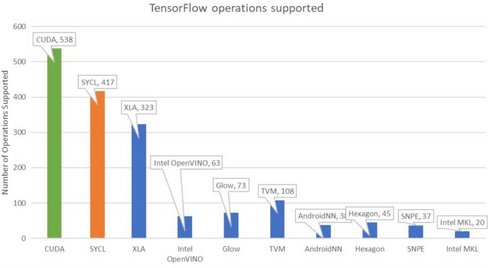TensorFlow gets native support for PowerVR GPUs via optimised open-source SYCL libraries
Open source SYCL neural network libraries optimised for PowerVR, with Codeplay making it easier for developers to port existing code
London, UK, and Santa Clara, USA; 23rd October 2019 – Imagination Technologies announces that developers working with TensorFlow will be able to target PowerVR GPUs directly thanks to newly optimised open source SYCL neural network libraries. The first release will be available in November 2019.
The SYCL version of TensorFlow supports a very large number of AI operations (see Graph 1) and is easily user-customisable, meaning that developers using the latest neural networks, or researching their own AI technologies, can run those networks out-of-the-box with high performance on PowerVR. Because TensorFlow SYCL support is both open source and open standards-based, it’s an ideal solution for developers who want to accelerate the latest AI technologies on low-power devices.

Graph 1 – TensorFlow Operations Supported by SYCL
SYCL is a royalty-free, open standards alternative to CUDA that breaks down ecosystem barriers providing more freedom for developers to write using standard C++, unlocking the performance benefits of GPU hardware and ensuring code portability.
Additionally, the Codeplay SYCL libraries allow applications to seamlessly leverage the IMGDNN PowerVR optimised API. IMGDNN is Imagination’s proprietary neural network graph compilation library that helps developers achieve the maximum performance from PowerVR GPUs and NNAs.
Key markets that can take advantage of this newly expanded ecosystem include automotive, data centre and smart cameras.
Neal Forse, Senior Director of Product Management, Imagination Technologies, says; “Working within an open standard framework gives developers peace of mind that their code won’t date or need to be rewritten. With access to the widely-used PowerVR GPU’s via SYCL, developers will have a powerful compute resource easily available under TensorFlow.”
Andrew Richards, CEO, Codeplay, says; “We are now seeing huge growth in market adoption of the SYCL standard. Renesas enables SYCL on their R-Car automotive AI platform and now Intel is including SYCL in their One API. This growth in standardisation for programming high performance accelerators like the PowerVR GPU will enable AI software developers to bring advanced intelligence to everything from tiny low-power battery devices to huge supercomputers.”
SYCL builds on the concepts and efficiency of Khronos OpenCL™. The PowerVR-optimised SYCL libraries – SYCL-DNN, SYCL-BLAS and Eigen – will be available on GitHub. A TensorFlow fork containing extended SYCL support is available from Codeplay’s GitHub.
Related Semiconductor IP
- Multi-channel Ultra Ethernet TSS Transform Engine
- Configurable CPU tailored precisely to your needs
- Ultra high-performance low-power ADC
- HiFi iQ DSP
- CXL 4 Verification IP
Related News
- Mentor Graphics Veloce Emulation Platform Used by Imagination for Verification of PowerVR Wizard Ray-Tracing GPU
- PowerVR GPUs from Imagination pass OpenVX conformance with Khronos
- Cadence Announces Complete Digital and Signoff Reference Flow for Imagination Technologies' PowerVR Series7 GPUs
- Latest Imagination PowerVR Series8XE GPUs set new standard for performance, power and area in cost-sensitive markets
Latest News
- ASICLAND Partners with Daegu Metropolitan City to Advance Demonstration and Commercialization of Korean AI Semiconductors
- SEALSQ and Lattice Collaborate to Deliver Unified TPM-FPGA Architecture for Post-Quantum Security
- SEMIFIVE Partners with Niobium to Develop FHE Accelerator, Driving U.S. Market Expansion
- TASKING Delivers Advanced Worst-Case Timing Coupling Analysis and Mitigation for Multicore Designs
- Efficient Computer Raises $60 Million to Advance Energy-Efficient General-Purpose Processors for AI